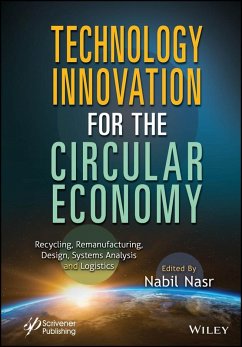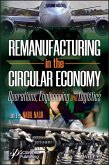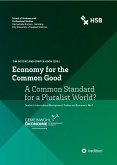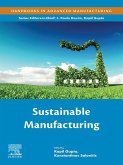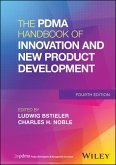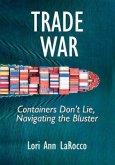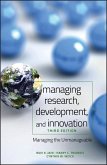Technology Innovation for the Circular Economy (eBook, ePUB)
Recycling, Remanufacturing, Design, System Analysis and Logistics
Redaktion: Nasr, Nabil


Alle Infos zum eBook verschenken

Technology Innovation for the Circular Economy (eBook, ePUB)
Recycling, Remanufacturing, Design, System Analysis and Logistics
Redaktion: Nasr, Nabil
- Format: ePub
- Merkliste
- Auf die Merkliste
- Bewerten Bewerten
- Teilen
- Produkt teilen
- Produkterinnerung
- Produkterinnerung

Hier können Sie sich einloggen

Bitte loggen Sie sich zunächst in Ihr Kundenkonto ein oder registrieren Sie sich bei bücher.de, um das eBook-Abo tolino select nutzen zu können.
TECHNOLOGY INNOVATION FOR THE CIRCULAR ECONOMY The book comprises 56 peer-reviewed chapters comprehensively covering in-depth areas of circular economy design, planning, business models, and enabling technologies. Some of the greatest opportunities for innovation in the circular economy are in remanufacturing, refurbishment, reuse, and recycling. Critical to its growth, however, are developments in product design approaches and the manufacturing business model that are often met with challenges in the current, largely linear economies of today's global manufacturing chains. The conference…mehr
- Geräte: eReader
- mit Kopierschutz
- eBook Hilfe
- Größe: 17.37MB
![Remanufacturing in the Circular Economy (eBook, ePUB) Remanufacturing in the Circular Economy (eBook, ePUB)]() Remanufacturing in the Circular Economy (eBook, ePUB)152,99 €
Remanufacturing in the Circular Economy (eBook, ePUB)152,99 €![Economy for the Common Good (eBook, ePUB) Economy for the Common Good (eBook, ePUB)]() Tim GoydkeEconomy for the Common Good (eBook, ePUB)4,99 €
Tim GoydkeEconomy for the Common Good (eBook, ePUB)4,99 €![Sustainable Manufacturing (eBook, ePUB) Sustainable Manufacturing (eBook, ePUB)]() Sustainable Manufacturing (eBook, ePUB)128,95 €
Sustainable Manufacturing (eBook, ePUB)128,95 €![The PDMA Handbook of Innovation and New Product Development (eBook, ePUB) The PDMA Handbook of Innovation and New Product Development (eBook, ePUB)]() The PDMA Handbook of Innovation and New Product Development (eBook, ePUB)108,99 €
The PDMA Handbook of Innovation and New Product Development (eBook, ePUB)108,99 €![Trade War (eBook, ePUB) Trade War (eBook, ePUB)]() Lori Ann LaroccoTrade War (eBook, ePUB)8,95 €
Lori Ann LaroccoTrade War (eBook, ePUB)8,95 €![Competitive Quality and Innovation (eBook, ePUB) Competitive Quality and Innovation (eBook, ePUB)]() Pierre MaillardCompetitive Quality and Innovation (eBook, ePUB)139,99 €
Pierre MaillardCompetitive Quality and Innovation (eBook, ePUB)139,99 €![Managing Research, Development and Innovation (eBook, ePUB) Managing Research, Development and Innovation (eBook, ePUB)]() Ravi JainManaging Research, Development and Innovation (eBook, ePUB)131,99 €
Ravi JainManaging Research, Development and Innovation (eBook, ePUB)131,99 €-
-
-
Dieser Download kann aus rechtlichen Gründen nur mit Rechnungsadresse in A, B, BG, CY, CZ, D, DK, EW, E, FIN, F, GR, HR, H, IRL, I, LT, L, LR, M, NL, PL, P, R, S, SLO, SK ausgeliefert werden.
- Produktdetails
- Verlag: John Wiley & Sons
- Seitenzahl: 816
- Erscheinungstermin: 19. Januar 2024
- Englisch
- ISBN-13: 9781394214273
- Artikelnr.: 69901257
- Verlag: John Wiley & Sons
- Seitenzahl: 816
- Erscheinungstermin: 19. Januar 2024
- Englisch
- ISBN-13: 9781394214273
- Artikelnr.: 69901257
Vincenzo Ferrero
Buddhika Hapuwatte
Noah Last and Nehika Mathur 2 Circularity Index: Performance Assessment of a Low-Carbon and Circular Economy 17 Luis Gabriel Carmona
Kai Whiting and Jonathan Cullen 3 Biodegradable Polymers For Circular Economy Transitions--Challenges and Opportunities 29 Koushik Ghosh and Brad H. Jones 4 Evaluating Nationwide Supply Chain for Circularity of PET and Olefin Plastics 43 Tasmin Hossain
Damon S. Hartley
Utkarsh S. Chaudhari
David R. Shonnard
Anne T. Johnson and Yingqian Lin 5 NextCycle: Building Robust Circular Economies Through Partnership and Innovation 55 Juri Freeman 6 My So-Called Trash: Evaluating the Recovery Potential of Textiles in New York City Residential Refuse 63 Sarah Coulter
Constanza Gomez
Agustina Mir and Janel Twogood 7 When is it Profitable to Make a Product Sustainable? Insights from a Decision-Support Tool 75 Karan Bhuwalka
Jessica Sonner
Lisa Lin
Mirjam Ambrosius and A. E. Hosoi 8 Clean Energy Technologies
Critical Materials
and the Potential for Remanufacture 95 T.E. Graedel Part 2: Enabling a Circular Economy Through AI & Machine Learning 101 9 Towards Eliminating Recycling Confusion: Mixed Plastics and Electronics Case Study 103 Amin Sarafraz
Nicholas Alvarez
Jonas Toussaint
Felipe Rangel
Lamar Giggetts and Shawn Wilborne 10 Identification and Separation of E-Waste Components Using Modified Image Recognition Model Based on Advanced Deep Learning Tools 115 Rahulkumar Sunil Singh
Subbu Venkata Satyasri Harsha Pathapati
Michael L. Free and Prashant K Sarswat 11 Enhanced Processing of Aluminum Scrap at End-of-Life via Artificial Intelligence & Smart Sensing 129 Sean McCoy Langan
Emily Molstad
Ben Longo
Caleb Ralphs
Robert De Saro
Diran Apelian and Sean Kelly 12 Deep Learning for Defect Detection in Inspection 143 Mohammad Mohammadzadeh
Pallavi Dubey
Elif Elcin Gunay
John K. Jackman
Gül E. Okudan Kremer and Paul A. Kremer Part 3: Design for Circularity 157 13 Calculator for Sustainable Tradeoff Optimization in Multi-Generational Product Family Development Considering Re-X Performances 159 Michael Saidani
Xinyang Liu
Dylan Huey
Harrison Kim
Pingfeng Wang
Atefeh Anisi
Gul Kremer
Andrew Greenlee and Troy Shannon 14 A Practical Methodology for Developing and Prioritizing Remanufacturing Design Rules 171 Brian Hilton 15 Recyclability Feedback for Part Assemblies in Computer-Aided Design Software 183 Bert Bras and Richard Lootens Part 4: Systems Analysis 197 16 Preliminary Work Towards A Cross Lifecycle Design Tool for Increased High-Quality Metal Recycling 199 Daniel R. Cooper
Aya Hamid
Seyed M. Heidari
Alissa Tsai and Yongxian Zhu 17 Assessing the Status Quo of U.S. Steel Circularity and Decarbonization Options 211 Barbara K. Reck
Yongxian Zhu
Shahana Althaf and Daniel R. Cooper 18 Fiber and Fabric-Integrated Tracing Technologies for Textile Sorting and Recycling: A Review 223 Brian Iezzi
Max Shtein
Tairan Wang and Mordechai Rothschild 19 A Systems Approach to Addressing Industrial Products Circularity Challenges 239 Manish Gupta and Umeshwar Dayal 20 Environmental and Economic Analyses of Chemical Recycling via Dissolution of Waste Polyethylene Terephthalate 255 Utkarsh S. Chaudhari
Daniel G. Kulas
Alejandra Peralta
Robert M. Handler
Anne T. Johnson
Barbara K. Reck
Vicki S. Thompson
Damon S. Hartley
Tasmin Hossain
David W. Watkins and David R. Shonnard 21 Techno-Economic Analysis of a Material Recovery Facility Employing Robotic Sorting Technology 269 S.M. Mizanur Rahman and Barbara K. Reck 22 Key Strategies in Industry for Circular Economy: Analysis of Remanufacturing and Beneficial Reuse 279 Subodh Chaudhari
Sachin Nimbalkar
Bruce Lung
Marco Gonzalez
Bert Hill and Bryant Esch 23 Spatio-Temporal Life Cycle Assessment of NMC111 Hydrometallurgical Recycling in the US 297 Francis Hanna
Luyao Yuan
Calvin Somers and Annick Anctil Part 5: Mechanical Recycling 309 24 Diverting Mixed Polyolefins from Municipal Solid Waste to Feedstocks for Automotive and Construction Applications 311 Tanyaradzwa S. Muzata
Alexandra Alford
Laurent Matuana
Ramani Narayan
Lawrence Drzal
Kari Bliss and Muhammad Rabnawaz 25 Ultrahigh-Speed Extrusion of Recycled Film-Grade LDPE and Injection Molding Characterization 321 Peng Gao
Joshua Krantz
Olivia Ferki
Zarek Nieduzak
Sarah Perry
Davide Masato and Margaret J. Sobkowicz 26 Composites from Post-Consumer Polypropylene Carpet and HDPE Retail Bags 333 Anuj Maheshwari
Mohamadreza Youssefi Azarfam
Siddhesh Chaudhari
Clinton Switzer
Jay C. Hanan
Sudheer Bandla
Ranji Vaidyanathan and Frank D. Blum 27 Upcycling of Aerospace Aluminum Scrap 343 Mohamed Aboukhatwa and David Weiss 28 Stabilization of Waste Plastics with Lightly Pyrolyzed Crumb Rubber in Asphalt 355 Yuetan Ma
Hongyu Zhou
Pawel Polaczyk and Baoshan Huang 29 Analysis and Design for Sustainable Circularity of Barrier Films Used in Sheet Molding Composites Production 365 Farshid Nazemi
Bhavik Bakshi
Jose Castro
Rachmat Mulyana
Rebecca Hanes
Saikrishna Mukkamala
Kevin Dooley
George Basile
George Stephanopoulos
Andrea Nahas
Aleen Kujur and Todd Hyche 30 An Update on PVC Plastic Circularity and Emerging Advanced Recovery Technologies for End-of-Life PVC Materials 379 Domenic DeCaria 31 Dynamic Crosslinking for EVA Recycling 395 Kimberly Miller McLoughlin
Alireza Bandegi
Jayme Kennedy
Amin Jamei Oskouei
Sarah Mitchell
Michelle K. Sing
Thomas Gray and Ica Manas-Zloczower Part 6: Chemical Recycling 407 32 Performing Poly(Ethylene Terephthalate) Glycolysis in a Torque Rheometer Using Decreasing Temperatures 409 Jonathan Hatt
Karl Englund and Hui Li 33 Sustainable Petrochemical Alternatives From Plastic Upcycling 421 Ryan A. Hackler and Robert M. Kennedy 34 PE Upcycling Using Ozone and Acid Treatments 433 Michael S. Behrendt
Brandon D. Howard
Scott Calabrese-Barton
John R. Dorgan
Samantha Au Gee and Amit Gokale 35 Enzyme-Based Biotechnologies for Removing Stickies and Regaining Fiber Quality in Paper Recycling 449 Yun Wang
Cornellius Marcello
Neha Sawant
Swati Sood
Qaseem Haider
Abdus Salam and Kecheng Li 36 Removal of Iron and Manganese Impurities from Secondary Aluminum Melts Using Microstructural Engineering Techniques 463 M.K. Sinha
B. Mishra
J. Hiscocks
B. Davi
S.K. Das
T. Grosko and J. Pickens 37 A Novel Solvent-Based Recycling Technology: From Theory to Pilot Plant 477 Ezra Bar-Ziv
Shreyas Kolapkar
George W. Huber and Reid C. Van Lehn 38 Valorization of Plastic Waste via Advanced Separation and Processing 495 Paschalis Alexandridis
Karthik Dantu
Christian Ferger
Ali Ghasemi
Gabrielle Kerr
Vaishali Maheshkar
Javid Rzayev
Nicholas Stavinski
Thomas Thundat
Marina Tsianou
Luis Velarde and Yaoli Zhao Part 7: Innovations in Remanufacturing 507 39 Image-Based Machine Learning in Automotive Used Parts Identification for Remanufacturing 509 Abu Islam
Suvrat Jain
Nenad G. Nenadic
Michael G.Thurston
Justin Greenberg and Brad Moss 40 Image-Based Methods for Inspection of Printed Circuit Boards 527 Nicholas Gardner
Cooper Linsky
Everardo FriasRios and Nenad Nenadic 41 Effects of Ultrasonic Impact Treatment on the Fatigue Performance of the High Strength Alloy Steel 541 Joha Shamsujjoha
Shirley Garcia Ruano
Mark Walluk
Michael Thurston and M. Ravi Shankar 42 Mechanical Properties of High Carbon Steel Coatings on Gray Cast Iron Formed by Twin Wire ARC 555 K. DePalma
M. Walluk and L. P. Martin 43 Towards Development of Additive Manufacturing Material and Process Technologies to Improve the Re-Manufacturing Efficiency of Commercial Vehicle Tires 573 Yiqun Fu
Tadek Kosmal
Ren Bean
Robert Radulescu
Timothy E. Long and Christopher B. Williams Part 8: Tire Recycling and Remanufacturing 585 44 Crumb Rubber From End-of-Life Tires to Reduce the Environmental Impact and Material Intensity of Road Pavements 587 Angela Farina
Annick Anctil and M. Emin Kutay 45 Tire Life Assessment for Increasing Re-Manufacturing of Commercial Vehicle Tires 599 Vispi Karkaria
Jie Chen
Chase Siuta
Damien Lim
Robert Radelescu and Wei Chen 46 Recycling Waste Tire Rubber in Asphalt Pavement Design and Construction 613 Dongzhao Jin and Zhanping You 47 Chemical Pre-Treatment of Tire Rubbers for Froth Flotation Separation of Butyl and Non-Butyl Rubbers 625 Haruka Pinegar and Jeffrey Spangenberger 48 Development of Manufacturing Technologies to Increase Scrap Steel Recycling Into New Tires 639 Seetharaman Sridhar
Subramaniam Rajan
Robert Radulescu and Narayanan Neithalath Part 9: E-Scrap Recycling 651 49 Selective Leaching and Electrochemical Purification for the Recovery of Tantalum from Tantalum Capacitors 653 R. Adcock
T. Chen
N. Click
M.-F. Tseng and M. Tao 50 Recovery of Lead in Silicon Solar Modules 665 Natalie Click
Randy Adcock and Meng Tao 51 Thermolysis Processing of Waste Printed Circuit Boards: Char-Metals Mixture Characterization for Recovery of Base and Precious Metals 677 Mohammad Rezaee
Joelson P. M. Alves
Sarma V. Pisupati
Charles Ludwig
Henry Brandhorst and Ernest Zavoral 52 Circular Economy and the Digital Divide: Assessing Opportunity for Value Retention Processes in the Consumer Electronics Sector 697 Kyle Parnell
Constanza Berrón
Chelsea Gulliver
Michael Thurston and Nabil Nasr Part 10: Pathways to Net Zero Emissions 713 53 Emission Reduction for an Imflux Constant Pressure Injection Molding Process 715 Birchmeier
Brandon
Lawless III
William F. and Santini
Kelly 54 Circular Economy Contributions to Decarbonizing the US Steel Sector 725 Julien Walzberg and Alberta Carpenter 55 Environmentally Extended Input-Output (EEIO) Modeling for Industrial Decarbonization Opportunity Assessment: A Circular Economy Case Study 739 Samuel Gause
Heather Liddell
Caroline Dollinger
Jordan Steen and Joe Cresko 56 Pathways to Net Zero Emissions in Manufacturing and Materials Production- HVAC OEMs Perspective 755 Deba Maitra
Swathy Ramaswamy
Cal Krause and Tiffany Waymer Acknowledgements 764 References 764 Index 767
Vincenzo Ferrero
Buddhika Hapuwatte
Noah Last and Nehika Mathur 2 Circularity Index: Performance Assessment of a Low-Carbon and Circular Economy 17 Luis Gabriel Carmona
Kai Whiting and Jonathan Cullen 3 Biodegradable Polymers For Circular Economy Transitions--Challenges and Opportunities 29 Koushik Ghosh and Brad H. Jones 4 Evaluating Nationwide Supply Chain for Circularity of PET and Olefin Plastics 43 Tasmin Hossain
Damon S. Hartley
Utkarsh S. Chaudhari
David R. Shonnard
Anne T. Johnson and Yingqian Lin 5 NextCycle: Building Robust Circular Economies Through Partnership and Innovation 55 Juri Freeman 6 My So-Called Trash: Evaluating the Recovery Potential of Textiles in New York City Residential Refuse 63 Sarah Coulter
Constanza Gomez
Agustina Mir and Janel Twogood 7 When is it Profitable to Make a Product Sustainable? Insights from a Decision-Support Tool 75 Karan Bhuwalka
Jessica Sonner
Lisa Lin
Mirjam Ambrosius and A. E. Hosoi 8 Clean Energy Technologies
Critical Materials
and the Potential for Remanufacture 95 T.E. Graedel Part 2: Enabling a Circular Economy Through AI & Machine Learning 101 9 Towards Eliminating Recycling Confusion: Mixed Plastics and Electronics Case Study 103 Amin Sarafraz
Nicholas Alvarez
Jonas Toussaint
Felipe Rangel
Lamar Giggetts and Shawn Wilborne 10 Identification and Separation of E-Waste Components Using Modified Image Recognition Model Based on Advanced Deep Learning Tools 115 Rahulkumar Sunil Singh
Subbu Venkata Satyasri Harsha Pathapati
Michael L. Free and Prashant K Sarswat 11 Enhanced Processing of Aluminum Scrap at End-of-Life via Artificial Intelligence & Smart Sensing 129 Sean McCoy Langan
Emily Molstad
Ben Longo
Caleb Ralphs
Robert De Saro
Diran Apelian and Sean Kelly 12 Deep Learning for Defect Detection in Inspection 143 Mohammad Mohammadzadeh
Pallavi Dubey
Elif Elcin Gunay
John K. Jackman
Gül E. Okudan Kremer and Paul A. Kremer Part 3: Design for Circularity 157 13 Calculator for Sustainable Tradeoff Optimization in Multi-Generational Product Family Development Considering Re-X Performances 159 Michael Saidani
Xinyang Liu
Dylan Huey
Harrison Kim
Pingfeng Wang
Atefeh Anisi
Gul Kremer
Andrew Greenlee and Troy Shannon 14 A Practical Methodology for Developing and Prioritizing Remanufacturing Design Rules 171 Brian Hilton 15 Recyclability Feedback for Part Assemblies in Computer-Aided Design Software 183 Bert Bras and Richard Lootens Part 4: Systems Analysis 197 16 Preliminary Work Towards A Cross Lifecycle Design Tool for Increased High-Quality Metal Recycling 199 Daniel R. Cooper
Aya Hamid
Seyed M. Heidari
Alissa Tsai and Yongxian Zhu 17 Assessing the Status Quo of U.S. Steel Circularity and Decarbonization Options 211 Barbara K. Reck
Yongxian Zhu
Shahana Althaf and Daniel R. Cooper 18 Fiber and Fabric-Integrated Tracing Technologies for Textile Sorting and Recycling: A Review 223 Brian Iezzi
Max Shtein
Tairan Wang and Mordechai Rothschild 19 A Systems Approach to Addressing Industrial Products Circularity Challenges 239 Manish Gupta and Umeshwar Dayal 20 Environmental and Economic Analyses of Chemical Recycling via Dissolution of Waste Polyethylene Terephthalate 255 Utkarsh S. Chaudhari
Daniel G. Kulas
Alejandra Peralta
Robert M. Handler
Anne T. Johnson
Barbara K. Reck
Vicki S. Thompson
Damon S. Hartley
Tasmin Hossain
David W. Watkins and David R. Shonnard 21 Techno-Economic Analysis of a Material Recovery Facility Employing Robotic Sorting Technology 269 S.M. Mizanur Rahman and Barbara K. Reck 22 Key Strategies in Industry for Circular Economy: Analysis of Remanufacturing and Beneficial Reuse 279 Subodh Chaudhari
Sachin Nimbalkar
Bruce Lung
Marco Gonzalez
Bert Hill and Bryant Esch 23 Spatio-Temporal Life Cycle Assessment of NMC111 Hydrometallurgical Recycling in the US 297 Francis Hanna
Luyao Yuan
Calvin Somers and Annick Anctil Part 5: Mechanical Recycling 309 24 Diverting Mixed Polyolefins from Municipal Solid Waste to Feedstocks for Automotive and Construction Applications 311 Tanyaradzwa S. Muzata
Alexandra Alford
Laurent Matuana
Ramani Narayan
Lawrence Drzal
Kari Bliss and Muhammad Rabnawaz 25 Ultrahigh-Speed Extrusion of Recycled Film-Grade LDPE and Injection Molding Characterization 321 Peng Gao
Joshua Krantz
Olivia Ferki
Zarek Nieduzak
Sarah Perry
Davide Masato and Margaret J. Sobkowicz 26 Composites from Post-Consumer Polypropylene Carpet and HDPE Retail Bags 333 Anuj Maheshwari
Mohamadreza Youssefi Azarfam
Siddhesh Chaudhari
Clinton Switzer
Jay C. Hanan
Sudheer Bandla
Ranji Vaidyanathan and Frank D. Blum 27 Upcycling of Aerospace Aluminum Scrap 343 Mohamed Aboukhatwa and David Weiss 28 Stabilization of Waste Plastics with Lightly Pyrolyzed Crumb Rubber in Asphalt 355 Yuetan Ma
Hongyu Zhou
Pawel Polaczyk and Baoshan Huang 29 Analysis and Design for Sustainable Circularity of Barrier Films Used in Sheet Molding Composites Production 365 Farshid Nazemi
Bhavik Bakshi
Jose Castro
Rachmat Mulyana
Rebecca Hanes
Saikrishna Mukkamala
Kevin Dooley
George Basile
George Stephanopoulos
Andrea Nahas
Aleen Kujur and Todd Hyche 30 An Update on PVC Plastic Circularity and Emerging Advanced Recovery Technologies for End-of-Life PVC Materials 379 Domenic DeCaria 31 Dynamic Crosslinking for EVA Recycling 395 Kimberly Miller McLoughlin
Alireza Bandegi
Jayme Kennedy
Amin Jamei Oskouei
Sarah Mitchell
Michelle K. Sing
Thomas Gray and Ica Manas-Zloczower Part 6: Chemical Recycling 407 32 Performing Poly(Ethylene Terephthalate) Glycolysis in a Torque Rheometer Using Decreasing Temperatures 409 Jonathan Hatt
Karl Englund and Hui Li 33 Sustainable Petrochemical Alternatives From Plastic Upcycling 421 Ryan A. Hackler and Robert M. Kennedy 34 PE Upcycling Using Ozone and Acid Treatments 433 Michael S. Behrendt
Brandon D. Howard
Scott Calabrese-Barton
John R. Dorgan
Samantha Au Gee and Amit Gokale 35 Enzyme-Based Biotechnologies for Removing Stickies and Regaining Fiber Quality in Paper Recycling 449 Yun Wang
Cornellius Marcello
Neha Sawant
Swati Sood
Qaseem Haider
Abdus Salam and Kecheng Li 36 Removal of Iron and Manganese Impurities from Secondary Aluminum Melts Using Microstructural Engineering Techniques 463 M.K. Sinha
B. Mishra
J. Hiscocks
B. Davi
S.K. Das
T. Grosko and J. Pickens 37 A Novel Solvent-Based Recycling Technology: From Theory to Pilot Plant 477 Ezra Bar-Ziv
Shreyas Kolapkar
George W. Huber and Reid C. Van Lehn 38 Valorization of Plastic Waste via Advanced Separation and Processing 495 Paschalis Alexandridis
Karthik Dantu
Christian Ferger
Ali Ghasemi
Gabrielle Kerr
Vaishali Maheshkar
Javid Rzayev
Nicholas Stavinski
Thomas Thundat
Marina Tsianou
Luis Velarde and Yaoli Zhao Part 7: Innovations in Remanufacturing 507 39 Image-Based Machine Learning in Automotive Used Parts Identification for Remanufacturing 509 Abu Islam
Suvrat Jain
Nenad G. Nenadic
Michael G.Thurston
Justin Greenberg and Brad Moss 40 Image-Based Methods for Inspection of Printed Circuit Boards 527 Nicholas Gardner
Cooper Linsky
Everardo FriasRios and Nenad Nenadic 41 Effects of Ultrasonic Impact Treatment on the Fatigue Performance of the High Strength Alloy Steel 541 Joha Shamsujjoha
Shirley Garcia Ruano
Mark Walluk
Michael Thurston and M. Ravi Shankar 42 Mechanical Properties of High Carbon Steel Coatings on Gray Cast Iron Formed by Twin Wire ARC 555 K. DePalma
M. Walluk and L. P. Martin 43 Towards Development of Additive Manufacturing Material and Process Technologies to Improve the Re-Manufacturing Efficiency of Commercial Vehicle Tires 573 Yiqun Fu
Tadek Kosmal
Ren Bean
Robert Radulescu
Timothy E. Long and Christopher B. Williams Part 8: Tire Recycling and Remanufacturing 585 44 Crumb Rubber From End-of-Life Tires to Reduce the Environmental Impact and Material Intensity of Road Pavements 587 Angela Farina
Annick Anctil and M. Emin Kutay 45 Tire Life Assessment for Increasing Re-Manufacturing of Commercial Vehicle Tires 599 Vispi Karkaria
Jie Chen
Chase Siuta
Damien Lim
Robert Radelescu and Wei Chen 46 Recycling Waste Tire Rubber in Asphalt Pavement Design and Construction 613 Dongzhao Jin and Zhanping You 47 Chemical Pre-Treatment of Tire Rubbers for Froth Flotation Separation of Butyl and Non-Butyl Rubbers 625 Haruka Pinegar and Jeffrey Spangenberger 48 Development of Manufacturing Technologies to Increase Scrap Steel Recycling Into New Tires 639 Seetharaman Sridhar
Subramaniam Rajan
Robert Radulescu and Narayanan Neithalath Part 9: E-Scrap Recycling 651 49 Selective Leaching and Electrochemical Purification for the Recovery of Tantalum from Tantalum Capacitors 653 R. Adcock
T. Chen
N. Click
M.-F. Tseng and M. Tao 50 Recovery of Lead in Silicon Solar Modules 665 Natalie Click
Randy Adcock and Meng Tao 51 Thermolysis Processing of Waste Printed Circuit Boards: Char-Metals Mixture Characterization for Recovery of Base and Precious Metals 677 Mohammad Rezaee
Joelson P. M. Alves
Sarma V. Pisupati
Charles Ludwig
Henry Brandhorst and Ernest Zavoral 52 Circular Economy and the Digital Divide: Assessing Opportunity for Value Retention Processes in the Consumer Electronics Sector 697 Kyle Parnell
Constanza Berrón
Chelsea Gulliver
Michael Thurston and Nabil Nasr Part 10: Pathways to Net Zero Emissions 713 53 Emission Reduction for an Imflux Constant Pressure Injection Molding Process 715 Birchmeier
Brandon
Lawless III
William F. and Santini
Kelly 54 Circular Economy Contributions to Decarbonizing the US Steel Sector 725 Julien Walzberg and Alberta Carpenter 55 Environmentally Extended Input-Output (EEIO) Modeling for Industrial Decarbonization Opportunity Assessment: A Circular Economy Case Study 739 Samuel Gause
Heather Liddell
Caroline Dollinger
Jordan Steen and Joe Cresko 56 Pathways to Net Zero Emissions in Manufacturing and Materials Production- HVAC OEMs Perspective 755 Deba Maitra
Swathy Ramaswamy
Cal Krause and Tiffany Waymer Acknowledgements 764 References 764 Index 767
